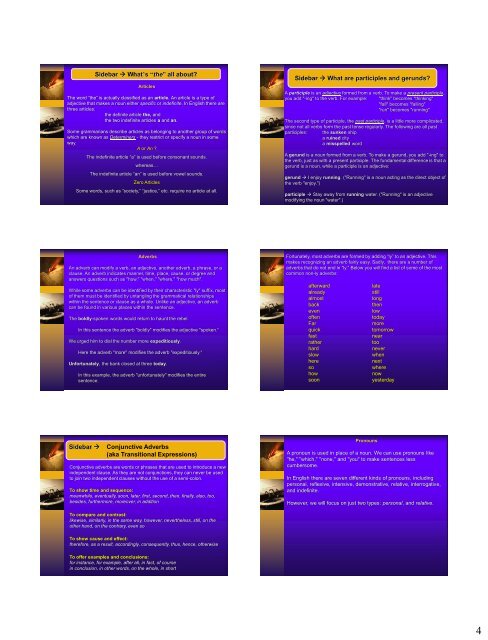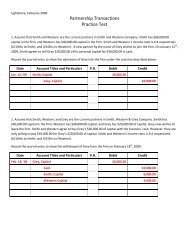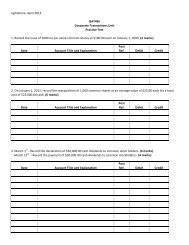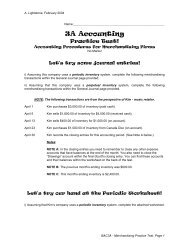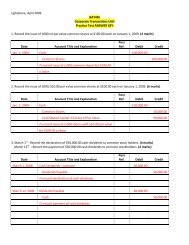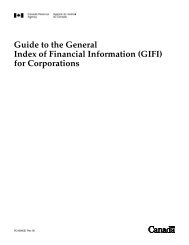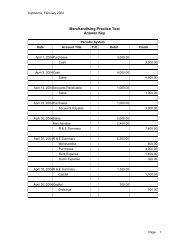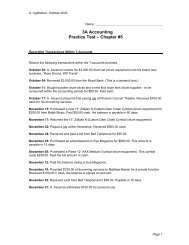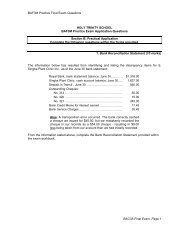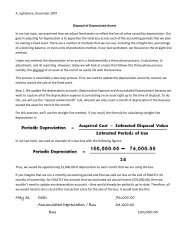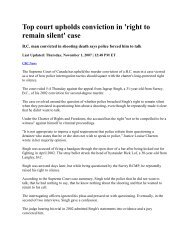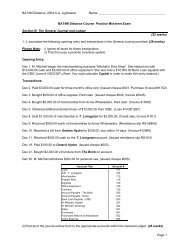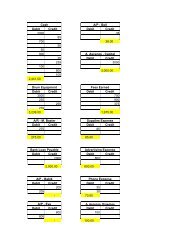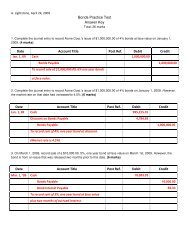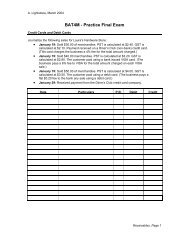Exploring the Parts of Speech - New Learner
Exploring the Parts of Speech - New Learner
Exploring the Parts of Speech - New Learner
You also want an ePaper? Increase the reach of your titles
YUMPU automatically turns print PDFs into web optimized ePapers that Google loves.
Sidebar What’s “<strong>the</strong>” all about?<br />
Articles<br />
The word “<strong>the</strong>” is actually classified as an article. An article is a type <strong>of</strong><br />
adjective that makes a noun ei<strong>the</strong>r specific or indefinite. In English <strong>the</strong>re are<br />
three articles:<br />
<strong>the</strong> definite article <strong>the</strong>, and<br />
<strong>the</strong> two indefinite articles a and an.<br />
Some grammarians describe articles as belonging to ano<strong>the</strong>r group <strong>of</strong> words<br />
which are known as Determiners - <strong>the</strong>y restrict or specify a noun in some<br />
way.<br />
A or An ?<br />
The indefinite article “a” is used before consonant sounds.<br />
whereas…<br />
The indefinite article “an” is used before vowel sounds.<br />
Zero Articles<br />
Some words, such as “society,” “justice,” etc. require no article at all.<br />
Sidebar What are participles and gerunds?<br />
A participle is an adjective formed from a verb. To make a present participle,<br />
you add "-ing" to <strong>the</strong> verb. For example: "think" becomes "thinking"<br />
"fall" becomes "falling"<br />
"run" becomes "running"<br />
The second type <strong>of</strong> participle, <strong>the</strong> past participle, is a little more complicated,<br />
since not all verbs form <strong>the</strong> past tense regularly. The following are all past<br />
participles: <strong>the</strong> sunken ship<br />
a ruined city<br />
a misspelled word<br />
A gerund is a noun formed from a verb. To make a gerund, you add "-ing" to<br />
<strong>the</strong> verb, just as with a present participle. The fundamental difference is that a<br />
gerund is a noun, while a participle is an adjective:<br />
gerund I enjoy running. ("Running" is a noun acting as <strong>the</strong> direct object <strong>of</strong><br />
<strong>the</strong> verb "enjoy.")<br />
participle Stay away from running water. ("Running" is an adjective<br />
modifying <strong>the</strong> noun "water".)<br />
Adverbs<br />
An adverb can modify a verb, an adjective, ano<strong>the</strong>r adverb, a phrase, or a<br />
clause. An adverb indicates manner, time, place, cause, or degree and<br />
answers questions such as "how," "when," "where," "how much".<br />
While some adverbs can be identified by <strong>the</strong>ir characteristic "ly" suffix, most<br />
<strong>of</strong> <strong>the</strong>m must be identified by untangling <strong>the</strong> grammatical relationships<br />
within <strong>the</strong> sentence or clause as a whole. Unlike an adjective, an adverb<br />
can be found in various places within <strong>the</strong> sentence.<br />
The boldly-spoken words would return to haunt <strong>the</strong> rebel.<br />
In this sentence <strong>the</strong> adverb "boldly" modifies <strong>the</strong> adjective "spoken.“<br />
We urged him to dial <strong>the</strong> number more expeditiously.<br />
Here <strong>the</strong> adverb "more" modifies <strong>the</strong> adverb "expeditiously.“<br />
Unfortunately, <strong>the</strong> bank closed at three today.<br />
In this example, <strong>the</strong> adverb "unfortunately" modifies <strong>the</strong> entire<br />
sentence.<br />
Fortunately, most adverbs are formed by adding “ly” to an adjective. This<br />
makes recognizing an adverb fairly easy. Sadly, <strong>the</strong>re are a number <strong>of</strong><br />
adverbs that do not end in “ly.” Below you will find a list <strong>of</strong> some <strong>of</strong> <strong>the</strong> most<br />
common non-ly adverbs:<br />
afterward<br />
already<br />
almost<br />
back<br />
even<br />
<strong>of</strong>ten<br />
Far<br />
quick<br />
fast<br />
ra<strong>the</strong>r<br />
hard<br />
slow<br />
here<br />
so<br />
how<br />
soon<br />
late<br />
still<br />
long<br />
<strong>the</strong>n<br />
low<br />
today<br />
more<br />
tomorrow<br />
near<br />
too<br />
never<br />
when<br />
next<br />
where<br />
now<br />
yesterday<br />
Sidebar <br />
Conjunctive Adverbs<br />
(aka Transitional Expressions)<br />
Conjunctive adverbs are words or phrases that are used to introduce a new<br />
independent clause. As <strong>the</strong>y are not conjunctions, <strong>the</strong>y can never be used<br />
to join two independent clauses without <strong>the</strong> use <strong>of</strong> a semi-colon.<br />
To show time and sequence:<br />
meanwhile, eventually, soon, later, first, second, <strong>the</strong>n, finally, also, too,<br />
besides, fur<strong>the</strong>rmore, moreover, in addition<br />
Pronouns<br />
A pronoun is used in place <strong>of</strong> a noun. We can use pronouns like<br />
"he," "which," "none," and "you" to make sentences less<br />
cumbersome.<br />
In English <strong>the</strong>re are seven different kinds <strong>of</strong> pronouns, including<br />
personal, reflexive, intensive, demonstrative, relative, interrogative,<br />
and indefinite.<br />
However, we will focus on just two types: personal, and relative.<br />
To compare and contrast:<br />
likewise, similarly, in <strong>the</strong> same way, however, never<strong>the</strong>less, still, on <strong>the</strong><br />
o<strong>the</strong>r hand, on <strong>the</strong> contrary, even so<br />
To show cause and effect:<br />
<strong>the</strong>refore, as a result, accordingly, consequently, thus, hence, o<strong>the</strong>rwise<br />
To <strong>of</strong>fer examples and conclusions:<br />
for instance, for example, after all, in fact, <strong>of</strong> course<br />
in conclusion, in o<strong>the</strong>r words, on <strong>the</strong> whole, in short<br />
4


